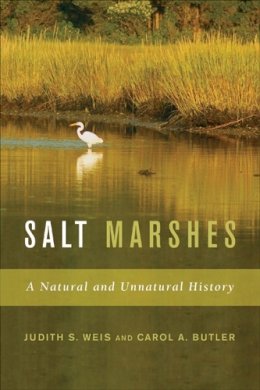10%OFF
Stock image for illustration purposes only - book cover, edition or condition may vary.
Salt Marshes: A Natural and Unnatural History
Judith S Weis
FREE Delivery in Ireland
Description for Salt Marshes: A Natural and Unnatural History
Paperback. .
Tall green grass. Subtle melodies of songbirds. Sharp whines of muskrats. Rustles of water running through the grasses. And at low tide, a pungent reminder of the treasures hidden beneath the surface.All are vital signs of the great salt marshes' natural resources.Now championed as critical habitats for plants, animals, and people because of the environmental service and protection they provide, these ecological wonders were once considered unproductive wastelands, home solely to mosquitoes and toxic waste, and mistreated for centuries by the human population. Exploring the fascinating biodiversity of these boggy wetlands, Salt Marshes offers readers a wealth of essential information ... Read moreabout a variety of plants, fish, and animals, the importance of these habitats, consequences of human neglect and thoughtless development, and insight into how these wetlands recover.
Judith S. Weis and Carol A. Butler shed ample light on the human impact, including chapters on physical and biological alterations, pollution, and remediation and recovery programs. In addition to a national and global perspective, the authors place special emphasis on coastal wetlands in the Atlantic and Gulf regions, as well as the San Francisco Bay Area, calling attention to their historical and economic legacies.
Written in clear, easy-to-read language, Salt Marshes proves that the battles for preservation and conservation must continue, because threats to salt marshes ebb and flow like the water that runs through them.
Show Less
Product Details
Publisher
Rutgers University Press
Place of Publication
New Brunswick NJ, United States
Shipping Time
Usually ships in 7 to 11 working days
About Judith S Weis
JUDITH S. WEIS is a professor in the department of biological sciences at Rutgers University, Newark. An expert on estuarine biology, she is past-president of the American Institute of Biological Sciences, and frequently serves as a consultant to the Environmental Protection Agency (EPA) and the National Oceanic and Atmospheric Administration (NOAA). CAROL A. BUTLER is the coauthor and ... Read morephotographer for an animal Q & A series from Rutgers University Press which includes Do Butterflies Bite? Fascinating Answers to Questions About Butterflies and Moths and forthcoming books on bees, hummingbirds, and bats. Show Less
Reviews for Salt Marshes: A Natural and Unnatural History
Judith S. Weis and Carol A. Butler put salt marshes into a broad environmental context. With chapters on marshland species, pollution, and restoration, this book is both valuable and encompassing for anyone interested in the future of salt marshes.
John M. Teal
Scientist Emeritus, Woods Hole Oceanographic Institution
Judith Weis and Carol Butler have created a clear, ... Read morewide-ranging, nontechnical explanation of salt marshes that will engage readers at every level of knowledge. Coastal residents, biology students, environmental planners, consultants, and naturalists should read this book.
Erik Kiviat
executive director, Hudsonia Ltd
In an accessible and sophisticated manner, SALT MARSHES draws on extensive ôlocal knowledgeö and a thorough grasp of much broader scientific literature to show the impact of humans on marshes and estuaries. This book is an important contribution to popular writing on coastal systems.
R. Scott Warren
Temple Professor of Botany Emeritus, Connecticut College
Weis and Butler discuss in detail the plants and animals that populate marshes, arranged by general complexity, beginning with small invertebrates and insects. Next is a historical overview, introducing the calamitous, long-held belief that marshes are little more than wastelands and a painful exploration of invasive species and their effects. Ongoing restoration projects are also profiled, and the volume concludes with thorough notes. This account should make an informative treat for any armchair conservationist.
Publishers Weekly
The authors provide a detailed account of the biodiversity of salt marshes and the tremendous benefits that they provide to the natural world. By enhancing understanding of the benefits of these areas, the damage caused to coastal marshes may be avoided in the future if we remain vigilant.
Wildlife Activist
As Weis and Butler indicate in this work, salt marshes have a natural history, but a long unnatural history due to their use and misuse by humans. This resource adds to the small collection of books that focus on salt marshes and their biology and economic value to humans. Recommended.
Choice
Show Less

